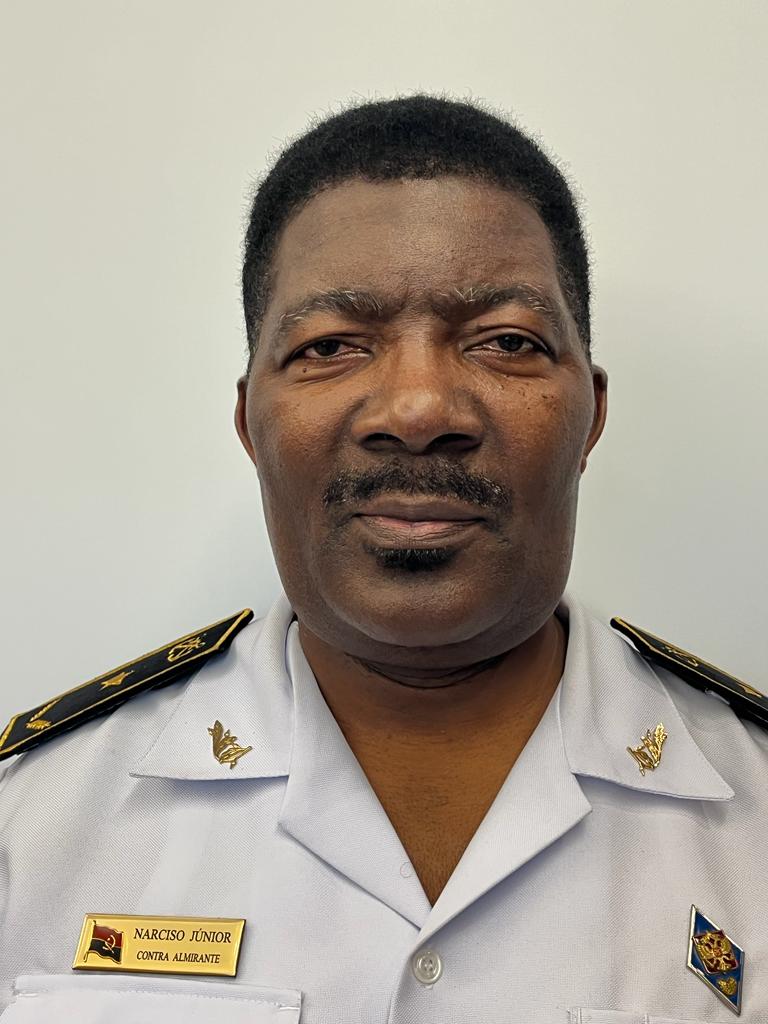English | Français | Português
 Rear Admiral Dr. Narciso Fastudo Jr. is the Executive Director of the Interregional Coordination Centre (ICC) in Yaoundé, Cameroon. The Centre is the body in charge of enhancing activities geared towards cooperation, coordination, mutualization, and systems interoperability as well as the implementation of the regional strategy on safety and security within the Central and West African common maritime space. Dr. Fastudo is a Naval Officer who has served the Angolan Armed Forces for many years: 15 years in the Air Force and 33 years in the Navy.
Rear Admiral Dr. Narciso Fastudo Jr. is the Executive Director of the Interregional Coordination Centre (ICC) in Yaoundé, Cameroon. The Centre is the body in charge of enhancing activities geared towards cooperation, coordination, mutualization, and systems interoperability as well as the implementation of the regional strategy on safety and security within the Central and West African common maritime space. Dr. Fastudo is a Naval Officer who has served the Angolan Armed Forces for many years: 15 years in the Air Force and 33 years in the Navy.
Dr. Fastudo has been an active alumnus of the Africa Center since 2006, when he attended the ministerial conference “Maritime Safety and Security in the Gulf of Guinea” in his capacity as Member of the South African Development Community (SADC) Standing Maritime Committee. Subsequent to this, Dr. Fastudo attended five additional Africa Center programs. Most recently, he attended “The Atlantic Partnership” seminar in July 2023, contributing to the academic content and presenting on “The South Atlantic Maritime Domain” alongside Admiral (ret.) Eduardo Bacellar Leal Ferreira of the Brazilian Navy. In his presentation, Dr. Fastudo highlighted the strategic importance of the South Atlantic for global security and prosperity. He also presented on “Maritime Threats, Crimes, and Vulnerabilities” to evaluate regional and international responses to piracy and armed robbery at sea in the Atlantic region.
According to Dr. Fastudo, for most of the 1900s, the evolution of maritime security in Africa was slow. Prior to their independence, most African countries were focused on land-based threats, not maritime threats. In the 1970s and 1980s, maritime security was only on the radar of African countries that had a navy, such as Algeria, Egypt, Nigeria, and South Africa. In 1982, the United Nations Convention on the Law of the Sea (UNCLOS) was signed in Montego Bay, Jamaica. With piracy attacks in Somalia, the topic of maritime security began gaining more attention in Africa in 1991. In the following decades, piracy problems spread to the Gulf of Guinea region resulting in the formation of the Gulf of Guinea Commission in 2001.
Over the past decade, Dr. Fastudo believes that the greatest evolution in maritime security has been the Yaoundé architecture which emerged from the Yaoundé Code of Conduct (YCC). The YCC is historically significant for all of the countries situated geographically from the southern tip of Mauritania to the northern tip of Namibia, says Dr. Fastudo. With it, the 19 coastal countries in this area adopted for the first time a plan to collectively secure the maritime domain. Prior to the YCC, these countries acted alone. With the YCC, there began a process of lasting collaboration.
Since its inception, YCC has become an example to the East African region and stands to be a future model for the whole of Africa. Dr. Fastudo summarized the development of the Yaoundé architecture over the past ten years as follows: Zone D of the architecture ripened first, with joint patrols in 2009. Zones E and F opted to work together and already have two successful joint missions. Zone G operates missions with the States but has not officially adopted Zone D’s model. Zone A is following the same path as Zone G, but given the diverse threats and risks in this area, Zone A is still in the process of determining the best infrastructure for operability. According to Dr. Fastudo, the latest development is the combination of the five current zones (A, D, E, F, and G) into a joint maritime task force for the Gulf of Guinea.
Dr. Fastudo believes that in the next decade, maritime security in the Gulf of Guinea will contribute significantly to the African Continental Free Trade Area (AfCFTA). Dr. Fastudo mentioned that both the AfCFTA and the blue economy rely on states’ ability to keep the maritime domain safe. Dr. Fastudo believes that there will be a consolidation of the systems of information exchange in the maritime domain where incidents will be reported to one entity, thereby overcoming the current possibility of disinformation and lack of information.
While recollecting on the 10th anniversary of the YCC, Dr. Fastudo commended the Africa Center for its academic offerings on relevant maritime security topics including piracy, institutional capacity building, IUU (illegal, unreported, and unregulated) fishing, resource management, urban fragility, and democracy, to name a few. He recounted fond memories of the Africa Center and views the Africa Center as a reliable institution for training.

